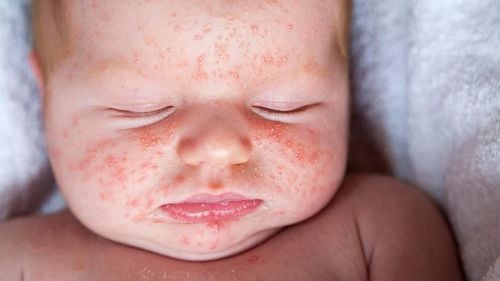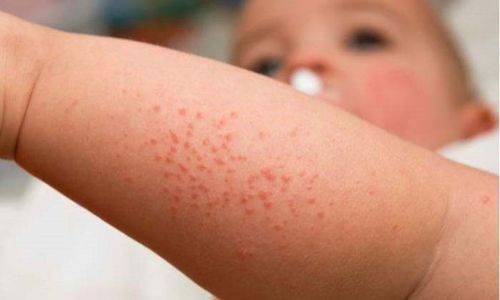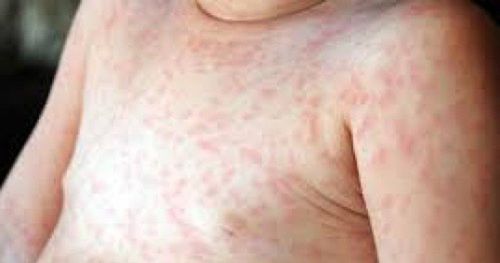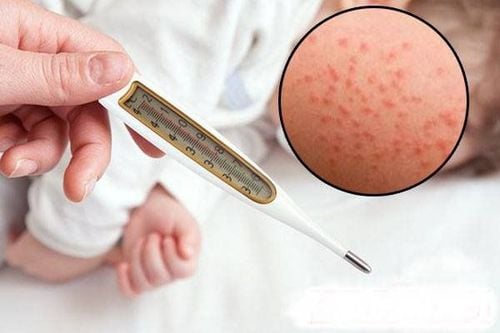This is an automatically translated article.
Measles is an acute bacterial infection caused by a virus, with a high rate of transmission, a disease that can cause epidemics and is common in children. Measles outbreaks in many countries in recent years, including Vietnam. Measles usually resolves on its own, but serious complications can occur, especially pneumonia and central nervous system complications.1. Why do children get measles?
Measles is mainly caused by a lack of antibodies against the measles virus. When a child is born until the 8th - 9th month, the child is given anti-measles antibodies by the mother, but then the amount of measles-antibodies transmitted by the mother will decrease rapidly.On the contrary, if the mother has few antibodies against measles or the mother has no antibodies to measles, the baby will not be born with antibodies against measles passed on by the mother. Mothers who have never had measles in their youth or have not been vaccinated against measles will not have antibodies to pass on to their babies.
A very important reason for children older than 9 months of age to get measles may be because the child has not been vaccinated against the disease or has not been vaccinated as recommended by the health industry. Children need to be vaccinated on time to avoid measles.
2. Measles transmission route
Children who do not yet have measles antibodies will easily be infected with the measles virus by inhaling these saliva particles. Children can also get measles virus if they let their hands come into contact with the floor, toys, towels, clothes, etc. that have measles virus, then put their hands on their mouth or nose to infect the virus. Children with measles can infect other children from the time they start showing symptoms until 4 days after the first rash appears. Measles easily spreads into epidemics in crowded areas such as kindergartens, kindergartens, schools, densely populated areas...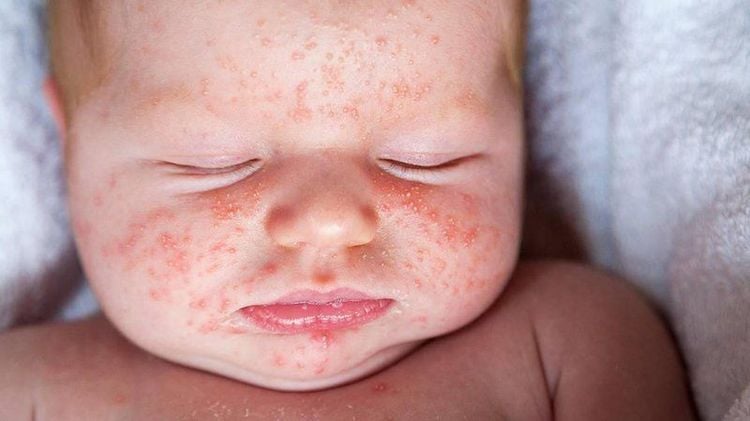
Trẻ chưa có kháng thể chống sởi sẽ dễ dàng bị lây nhiễm virus sởi khi hít phải các hạt nước bọt này
3. Complications of measles
3.1 Measles respiratory complications: Pneumonia: Measles pneumonia can occur in 80% of infected children and account for 20 - 100% of deaths from measles in developing countries.Bronchitis: often due to superinfection, appearing at the end of the rash period. Children show fever again, cough a lot, hear the lungs have bronchial rales, white blood cells increase, on the X-ray film, the image of the bronchi is clearly seen.
Bronchitis - lung: this is a complication of superinfection, Usually appears late after the rash develops. Severe manifestations: children with high fever have difficulty breathing, there are many bronchial rales in the lungs, increased white blood cells. X-ray film showed scattered opacities in both lungs. This complication is very dangerous and is often the cause of death in measles, especially in young children.
Laryngitis: complications of laryngitis can be seen in the stages of measles. Complications at an early stage are caused by measles virus appearing at the onset, the first stage of the rash, which may disappear with the rash, children have difficulty breathing due to laryngospasm. Complications of measles in the late stage are due to superinfection (common because children with measles are infected with staphylococci, streptococci, pneumococcus...), appearing after the rash develops. The course is usually severe: the child has a high fever, cough, hoarseness, difficulty breathing, cyanosis.
Acute otitis media: this is the most common complication of measles in the United States: 14% of children < 5 years of age. Inflammation of the Eustachian tubercle epithelium causes obstruction and secondary infection. The incidence of otitis media is lower in older children because the diameter of the Eustachian tube increases with age, reducing the risk of obstruction. Cause: H.influenzae, S.pneumoniae
Other complications: atelectasis, emphysema, pneumomediastinum (rare).
3.2 Neurological complications: Acute meningitis - encephalitis: this is a dangerous complication with high mortality and sequelae, common in older children (school age), appearing in the first week of the rash ( your day 3 - 5). Symptoms of the disease start suddenly, the child has a high fever, may convulsions, consciousness disorders such as coma, hemiplegia or unilateral limb paralysis, cranial nerve palsy III, VII. In addition, children often have pyramidal - extrapyramidal syndromes, cerebellum, vestibular... Complications of myelitis manifest in the form of paralysis of the lower limbs, sphincter disorders.
Meningitis: Another neurological complication of measles is serous meningitis and purulent meningitis following superinfection otitis.
Subacute fibrotic leukoencephalitis: is a rare complication that is difficult to predict and leaves serious sequelae, seen at the age of 2-20 years, appearing late after several years of measles infection. This shows that the measles virus can live for many years in the body of a patient with an abnormal immune response. The course of complications ranges from a few months to a year. The patient can die in the state of hypertonia and cerebral spasticity.
Complications of the ear - nose - throat: common are superinfected nasopharyngitis, otitis externa and mastoiditis.
Complications of the oral cavity - inflammation of the oral mucosa: occurs in the early stages of measles caused by the measles virus, which usually disappears with the rash. Complications occurring in the late stages of measles are often due to superinfection.
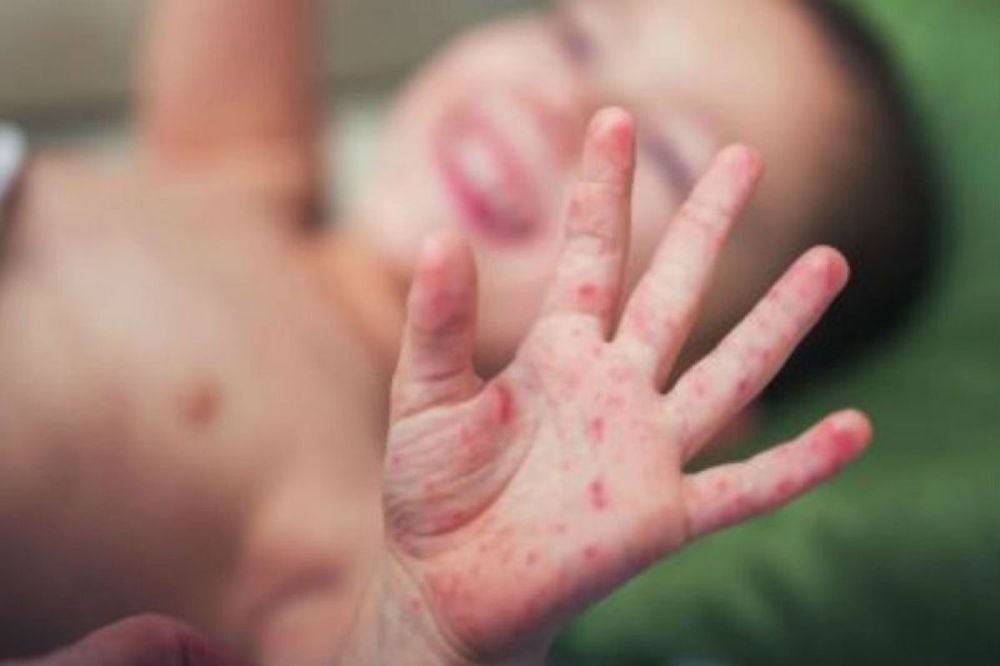
Biến chứng viêm phổi của bệnh sởi có thể gặp ở 80% trẻ mắc bệnh
4. Taking care of children to prevent complications of measles
Increase adequate nutrition to prevent malnutrition when children are sick. Drink a lot of fruit juice, eat liquid food, enough nutrients, should not be excessively abstinent. Enhance oral hygiene and personal hygiene for children to avoid opportunistic infections. Children who are sick or suspected to have measles must be isolated, absent from school and not in crowded places to avoid spreading in the community. Parents and caregivers should wear masks when interacting with children. Wash hands with soap after contact. Disinfect floors, children's toys, tools, and objects with chloramine B solution. Respiratory complications are most common in children with measles, so parents need to pay attention to detect and treat them as soon as possible. . Persistent fever for more than 5 days should pay attention to the possibility of complications, need to be fully screened, especially chest X-ray. Treat with appropriate respiratory support according to the regimen, without using systemic corticosteroids. High dose vitamin A supplement. When a child has an abnormal problem, parents need to take the child to a medical facility for proper diagnosis and treatment by a doctor to avoid dangerous complications.Pediatrics department at Vinmec International General Hospital is the address for receiving and examining diseases that infants and young children are susceptible to: respiratory tract infections, viral fevers, bacterial fevers, ear infections. middle, pneumonia in children, .... With modern equipment, sterile space, minimizing the impact as well as the risk of disease spread. Along with that is the dedication from the doctors with professional experience with pediatric patients, making the examination no longer a concern of the parents.
Please dial HOTLINE for more information or register for an appointment HERE. Download MyVinmec app to make appointments faster and to manage your bookings easily.





